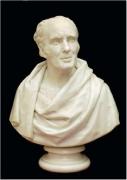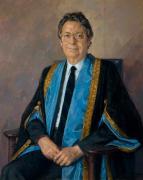|
|
||||||||||||||||||||||||
 |
Featured person
Recently added |
James McDonnell (1763 - 1845): |
||||||||||||||||||||||

|
| Dr. James McDonnell Bust in Royal Victoria Hospital Belfast |
James McDonnell was born in Cushendall, Co Antrim on 14 April 1763, son of Michael and Elizabeth (Stewart). Under his mother’s influence James and his brothers were brought up as Protestants although their father was a Catholic. James was educated in the Red Bay caves and then in David Manson’s school in Donegall Street in Belfast. James and his brothers were taught to play the harp by the blind harper Art O’Neill. In 1780 James went to Edinburgh University where he graduated as MD. He then returned to Belfast, setting up his own practice in 13 Donegall Place where he remained for the rest of his life, becoming a leading figure in medicine and medical education and also in literary, scientific and cultural activities.
In 1792 McDonnell helped to organise the Belfast Harp Festival and in 1808 the Irish Harp Society and he encouraged Edward Bunting to continue his collection of Irish Folk Music and Ballads. He was the inaugural President of the Belfast Literary Society in 1801. He was a foundation member, in 1788, of the Belfast Reading Society (now the Linen Hall Library) and was a member of the Belfast Natural History and Philosophical Society.
He was a friend of the leading personalities in the United Irishman movement including Wolfe Tone, Samuel McTier, William Sinclair, Thomas Russell, Samuel Neilson, Henry Joy McCracken and others. Tone stayed with him in 1791 while the Society of United Irishmen was being formed. When Thomas Russell fell on hard times McDonnell arranged for him to be appointed as Librarian at the Linen Hall Library.
While McDonnell was sympathetic to the aims of the United Irishmen he did not favour physical force. When Henry Joy McCracken was hanged for his part in the Rebellion McDonnell was asked to revive him (Mary Ann McCracken had arranged for him to avoid being beheaded after the hanging, which was the usual treatment for the rebels); he did not attend but sent his brother instead. When in 1803 Russell returned from exile in France to help raise County Down in support of the Robert Emmett Rebellion a reward for his capture was posted and McDonnell contributed £50 to the appeal. Russell’s efforts were in vain mainly due to the abject failure of the 1798 Rebellion and the passing of the 1800 Acts of Union; he was captured, tried, convicted and executed in Downpatrick just short of his 33rd birthday. This seeming act of betrayal of a former friend led to a major split with many of his former friends in the movement and McDonnell was dubbed ‘The Brutus of Belfast’ in a poem by Martha McTier. Happily, the animus did not last and he was reconciled with most of them eventually.
McDonnell helped to found the Belfast Academical Institution (later the Royal Belfast Academical Institution) in 1810. He was variously Visitor and Manager of the Institution for 4 four-year terms from 1810 to 1837. He worked with RBAI and the RVH (then known as the Belfast General Hospital) to establish a Faculty of Medicine.
In 1792 McDonnell helped to set up the Belfast General Dispensary.” This and two attempts to set up a Dispensary and Fever Hospital in 1797 and 1799 failed before being established in 1817 in West Street as “The Belfast Fever Hospital and Dispensary” which later became the General Hospital in Frederick Street and then the Royal Victoria Hospital. In all these efforts McDonnell was the driving force.
In 1822 he revived the Belfast Medical Society and it remains in being as the Ulster Medical Society.
McDonnell was a respected and well-loved figure in Belfast for many years. In 1828 he was presented with a ten-piece silver service to which 130 of “the Nobility, Ladies and Gentlemen of the Belfast vicinity” subscribed “as a tribute of their respect and esteem”.
Dr James McDonnell died in Belfast on 5 April 1845 and was buried in Layde Churchyard in Cushendall under a Celtic cross.
| Born: | 17 April 1763 |
| Died: | 05 April 1845 |
| Ulster History Circle |
| Acknowledgements: Sir Peter Froggatt |


Home | Our Policies | Plaques | Browse | Search | Sponsors | Links | Help | Contact
Privacy & Disclaimer | Cookie Policy | Site Map | Website Design By K-Point
© 2024 Ulster History Circle









